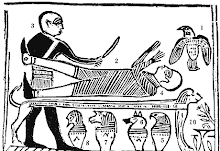I'm hoping that this can be a place to explore mystical elements of Mormon belief. I stumbled across a blog from a fellow who had literally written the book on Mormon mysticism, but from everything I could tell his idea of mysticism is just deep reading of the scriptures and kabbalistic texts. For him, it seemed that mysticism just means any theology that takes a lot of reading to figure out. This isn't my idea of mysticism, so I guess I'd better explain what I have in mind as far as that goes.
I was listening to the radio the other day, and I heard a radio program which featured an improv troupe from Chicago. They go around town and orchestrate strange happenings in which the unwitting participants have an unshakable feeling that something freakish is happening, outside of normal possibilities. For example, on a particular subway line, one person after another got on the train wearing no pants. After the car was loaded with pants-less people, a vendor came down the aisle selling pants.
I think that mysticism is sort of like that: it explores a world in which there are more possibilities than one might usually assume. I think that religion for the vast majority of Mormons occurs in a world where which fits neatly within the reality of their gentile neighbors, where nothing is amiss. For them, religion is defined by mandates and directives from HQ, and official interpretations of scripture, and theology explained in flow charts and diagrams. All of this is institutional in nature, top down.
On the other hand, I think there are many elements inherent in Mormon belief that operate in a different world, full of unexpected possibilities. These possibilities are created through personal choice and personal belief, quite independent of intstitutional practice. To generalize, we might say that many of these mystical practices are defined by the use of physical objects to effect tangible pro-active changes in destiny, cosmos, or knowledge. More common of these approaches would include priesthood applications with consecrated oil; fasting to alter fate; interpretation of dreams; prophesy using seer stones; water witching or other divination using sticks or rods, etc.
I would like to explore some of these ideas.
December 6, 2009
Subscribe to:
Post Comments (Atom)



1 comment:
Glad to have come across your site. I have also been to that other blog. I think a lot of the discussion there is hindered by secular debating. Plus it is hard to explain mystical experiences in a religious context with most westerners without providing overloads of background information as proper context. Plus most western-minded individuals tend to need to be turned on intellectually before they are willing to buy into working towards a mystical experience. Anyway, I am intrigued by your perspective to explore unexpected possibilities. I am fascinated by how much spiritual experiences, revelations, ministration of angels, etc. are available to the LDS people, but most of them seem unaware of these things. Some even seem to feel like they are not expedient in our current culture. An explanation that has come to mean a lot to me is:
“The scriptures are like a doorway and door that divides mortal man from the presence of God. Some people approach the scriptures and are impressed by the trueness of the frame, the strength of the door, and the perfection of the entire architecture. Other people approach the scriptures and are impressed by the mechanics and power of the hinges and lock. As these people become expert in the science of the doorway they easily attract and impress others with their vast knowledge and wisdom. “I could never begin to gain such a knowledge or understand such things on my own,” some onlookers say. “We must protect and defend our teachers at all costs,” other onlookers say. And while the frame may be true, the door may be strong, the architecture perfect, the hinges and lock powerful and impressive, the purpose of the scriptures is to open the door and allow mortal man access to the fullness of the presence of God.”
Although this describes the scriptures, I think it can also be applied to any aspect of the gospel to expand the possibilities within the practice. I once heard a good talk on the Book of Mormon that emphasized that it is not so important that we read the Book of Mormon everyday, but how we use the Book of Mormon when we read it. Sadly most people don’t conceive of possibilities and therefore never aim their intentions and efforts to fulfilling those possibilities.
I would love to hear more of your thoughts. As a disclaimer, I am studied in Kabbalah as well, but I am more about gaining knowledge of God through experiencing Him firsthand than I am about unfamiliar jargon and complicated scriptural problem solving. To me and those I have studied under, our actual perception and understanding of God’s character, attributes, intentions, and interactions is the goal of our study. And study without this goal is a hindrance to the student. Anyway, I said this because I may quote the occasional Kabbalist, but only in ways that support ideas that you have already expressed on your site.
Post a Comment